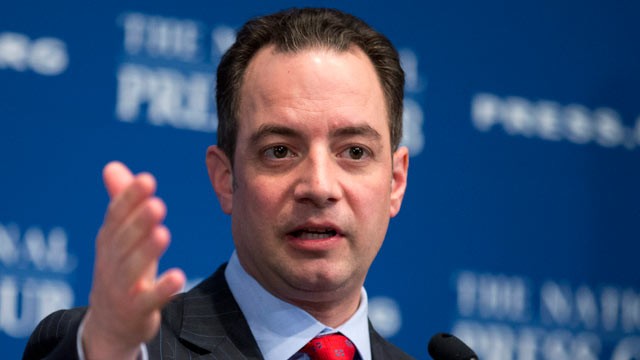 |
| Reince Priebus: We've gotta change. What? Oh, you know, our image. Policies? Nah. |
The occasion of this examination of the Republican Party is its new report, more than ironically entitled the Growth & Opportunity Project. Here's a
link to its
content and some
reaction.
There are an endless number of expositions and explanations out there. Pick your poison. Can the GOP change? Should the GOP change? Will the GOP change?
Shorter explanation: The GOP is the GOP. It can't change for a number of reasons. It can, however, become something else. The Whigs. The Libertarian Party. The Confederacy. Or, God forbid, the Tea Party. But it can't be the GOP.
Well, yes, it can. That GOP would be the pre-Tea-Party GOP. The pre-Obama GOP. The wishful-thinking GOP. Maybe even the pre-Bush GOP, though that would, I suppose, be the Gingrich GOP. Uh-oh. Or maybe the Denny Hastert GOP. Denny who?
Going back to the George H. W. Bush GOP might do it, but how do you get there? Have Jeb Bush morph into his father and hope the Tea Party, Fox News, and Rush Limbaugh let him take over? Not gonna happen, not unless he leaves his dad's legacy behind and joins the hard right.
Can the GOP go all the way back to Ronald Reagan? No, because that's part of the problem: The highly lionized Gipper has achieved such sainthood among the hard right that they own him now. Well, they don't own him, they own their
wildly mythologized version of him, which essentially means that Ronald Reagan is as big an albatross around the GOP's neck as
epistemic closure is.
You can't change what doesn't exist. The GOP doesn't exist, not in the form that the GOP autopsy -- as they've taken to calling it -- thinks it could exist.
 |
| Think the Gipper changed the GOP? Think again. |
There's lots of blame to go around. One could blame Fox News, with its O'Reillys, Hannitys, Coulters, and Palins, for its extension of the echo chamber, or Rush Limbaugh, for his creation of it. You can even blame the myriad Republicans over the years that blew up the Ronald Reagan Macy's Parade balloon into its absurd dimensions. But you'd be wrong. The original sin of today's GOP was committed by Richard Nixon.
I'm not talking about his policies, which by today's standards are
left of Bill Clinton's, nor his paranoia, which ultimately brought his world crashing down. No, I'm talking about his politics, which was simply called the
Southern Strategy.
There, in a nutshell, lie the seeds of destruction of today's GOP, to horribly mangle the metaphor.
When Richard Nixon realized that he could defeat the Democrats in 1968 by shattering -- or, better yet, taking advantage of the shattering of -- the old Democratic coalition, pulling the Dixiecrat South away from the Democratic industrial Northeast. He did it, or used it, and retook the presidency.
Nixon did not, you may remember, begin to dismantle the Great Society. He extended it, built upon it. No, his policies were, though uneven, essentially based on the social-compact foundation of presidents from FDR to LBJ. But rhetorically, he continually threw red meat to the South, especially in his condemnation of the anti-war effort in which he praised the "silent majority." Eventually, Reagan would grab this part of the political landscape and run with it.
 |
| Little Rock Central High, 1957: Yes, this is the Southern Strategy in one picture. |
Remember, Reagan began his path to the presidency with
a speech at Philadelphia, Mississippi. Later, George W. Bush saved his 2000 campaign -- after losing the New Hampshire primary to John McCain -- with
a speech at South Carolina's Bob Jones University, where interracial dating was prohibited. Both demonstrated unvarnished messaging, well beyond wink-wink-nudge-nudge. It was mush more like "Hey, whites, we're on your side. You are the America we believe in."
And Southern white America has never forgotten. They
are the Republican Party at the core. Add to them the Sun Belt, the Plains States, and all the way over to Idaho, Utah, and Montana, anywhere where white Christians fear the heathen brown masses. (Ironically, Latinos and blacks are among the most dedicated Christians in our nation).
It worked, this coalition, for quite a while, and yes, what caught up to it is demographically driven. But it's much more complicated than that.
The GOP coalition has policies that isolate its membership to a shrinking minority who have deeply held beliefs that exclude nearly all minorities, including women, while the Democratic coalition is held together by a belief system and policies that are nearly perfect to capture the allegiance of minorities, including women.
And, the Democratic coalition also attracts
educated whites, including white males.
That's the clincher.
 |
| The GOP wants to keep its policies and change its messaging? Good luck with that. |
So what does the RNC report on resuscitating the Republican Party want to do?
- Pass immigration reform now. Probably not going to happen. The right-wing won't allow a path to citizenship and without it the progressives won't let reform pass. Still, Latinos will blame the GOP. If it passes without a path to citizenship, Latinos will still blame the GOP, even if it's moderate Democrats that let it happen.
- Listen to minorities. Listening is fine. After listening, what changes? A black lesbian named Rodriguez wins the CPAC 2014 straw poll? Right.
- Be more inclusive toward gays. Okay, fine. Will the GOP rewrite its party platform to support gay marriage, gay adoption, and other issues important to gays? Just don't see that happening.
- Stop being the party of rich white people. Herman Cain notwithstanding, the Republicans' bread-and-butter issues are built around tax cuts for the rich. What will they do to change it? They've already marked out this territory. Their policy: no tax hikes. If they gave in and met Obama halfway on tax increases for spending cuts, it'll be seen as a Democratic win and a Republican loss. Thus they appear weak, not generous.
- End epistemic closure. How do Fox News, the Wall Street Journal, talk radio, the Weekly Standard, and National Review Online all begin to change their tune? They whistle their tune over and over and over because these dog whistles make them a ton of money. And the Tea Party is going to stop sitting in the echo chamber that is their wheelhouse? Hard to imagine it.
- Look to the states to help revitalize the party. This makes a little sense. The proof of the pudding will be the 2014 midterms. If the GOP expands or simply maintains its hegemony with state governments, there's a chance that it will serve to strengthen the Republican grip, at least on the state level. It's on the national stage, though, that the GOP needs help. It takes more than Chris Christie, for chrissake.
The bottom line may be that even if Republicans make many of the changes the Growth & Opportunity Project hopes they can, what stops the hardcore conservative base from bolting? The fact that there's no other place out there for them to go? How about the Libertarian Party or Tea Party or White Christian Party? This may be how a real third party gets born. We'll see soon enough.
 |
| Hey GOP, wanna look like this? Sorry, space taken by the Democrats, thank you. |




























